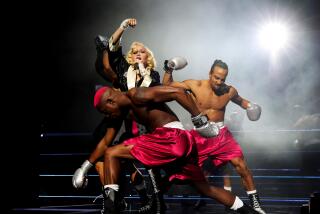6,000 Sing ‘We Are the Women’ as Forum ’85 Gets Off to Festive Start
- Share via
NAIROBI — We are the world
We are the women
We are the ones who do two-thirds of the work
So let’s start living. . . .
Forum ‘85: The 1985 Non-Governmental World Meeting for Women opened officially Wednesday at the Kenyatta Conference Center here. The festive mood is reflected in the parody they sang. The crowd, estimated at 6,000, most of them women, packed the assembly hall and balconies, overflowed the hallways and stairways, while hundreds more milled around on the mall outside.
Crowds of women, many of them in national or tribal dress, cheerfully jostled each other through packed doorways as every one of them passed through airport-style metal detectors and handbag searches. They came loaded with tape recorders, cameras--which they handed to obliging strangers for group shots--and growing armloads of conference paraphernalia. Japanese women, anticipating a day that was likely to get out of hand, brought their lunches in bento boxes.
Once inside they patiently waited for the increasingly stuffy hall to fill up, entertained sporadically by Kenyan school choirs. They gamely faltered their way through a new song composed for the forum, then happily sang out full-throated when the “We Are the World” parody was introduced.
And they lost no time working the room--networking style. Bella Abzug, smiling and seasonal in a natural straw hat, made her way down an aisle, stopped constantly by friends and strangers.
One Australian woman beamed up at her from her chair and said with wistful admiration, “To think if somebody like me could get to talking to somebody like you. . . .”
“Anytime, anytime,” Abzug assured her.
“You know, I stood for election once. . . .”
“Listen, we have a panel coming up,” Abzug went on, inviting her to next week’s panel on elected women called “What If Women Ran the World” that she was conducting.
Loret Miller Ruppe, director of the Peace Corps, appeared in the crush near the back of the hall. The Peace Corps has arranged for interested forum participants to visit volunteers on sites outside of Nairobi. In addition, she said, they had flown in three volunteers from various regions of the world where the Peace Corps operates.
In another section of the room, three Afghan men dressed in well-tailored business suits made use of the wait to get in an earnest conversation with some young American black women from Atlanta. Clearly in support of their country’s current Soviet-backed regime they carefully explained their version of the current situation. The other topic of conversation was their repeated protestations that the official American stance against “politicizing” the forum and conference was unfeasible and impossible. They got no argument on that from the American women.
Meanwhile, women from the ad-hoc committee of non-governmental forum participants staying at the Inter-Continental Hotel passed out bulletins about a meeting scheduled for that night. They are appealing to all women who find themselves in the same dilemma--that is, being forced out of a prepaid hotel room on the 12th to make room for the governmental delegations arriving for the official U.N. conference marking the end of the Decade for Women--to join them in their protest. They are considering a lawsuit. They are refusing to vacate their rooms until the matter is solved to their satisfaction. In the meantime they have invited delegates to share their rooms with them.
Three American women from the Overseas Education Fund International who are staying at the Inter-Continental took the bulletin and discussed their dilemma.
Connie Horak of Los Angeles and Marelyn Tank and Maxine Hitchcock of Washington said the fund has official status for the conference and conceivably does not come under the eviction, or would not if they pulled rank.
However, they have with them, Hitchcock said, 30 invited guests from Third World countries, whose trips have been financed by the Ford Foundation. These women are to be bumped too.
The irony, Hitchcock said, is that all 30 of them are lawyers and have been participating in an OEF project, about which they will conduct panels at the forum. The project? How to help Third World women become aware of their legal rights and secure them. It is no wonder, she said, that these 30 lawyers have been playing a major role in challenging the U.N. Secretariat and Kenyan government over accommodations.
The OEF women, she said, simply did not know how they would proceed, and she called it “our moral problem.”
Meanwhile, several seats down from her a South African woman in traditional dress asked an American if she had a bottle opener. The South African had brought two Cokes with her. The two of them tried the American’s eyebrow tweezers, then finally succeeded with a coin.
The ceremonies started with Dame Nita Barrow of Jamaica, the Forum ’85 convener, making the first of many welcomes the crowd would hear that morning, including those of Leticia Shahani of the Philippines, secretary general of the official conference and Margaret Kenyatta, leader of the Kenya delegation. Except for a few Swahili greetings, the language of the day was English, with comparatively few people seeming to make use of the headphones provided for translation.
Barrow was followed by Eddah Gachukia of Kenya, the chairman of Kenya’s non-governmental organizations organizing committee, who told the women they had initially been expecting 3,000 participants. It was not by accident that the forum was taking place in a Third World country, and the proceedings would reflect that concern to make life better for those women.
It fell to Gachukia to introduce the main speaker, K.S.N. Matiba, minister of culture and social services, under whose department the forum was put together.
First, however, a Kenyan women’s choir came out and thanked the minister and welcomed the guests in what Gachukia called “traditional style.”
To drums and rhythmic stamping the women sang mabibi tuungane , (all women, unite). The music took the crowd over until it became thrilling, gathering in intensity until Matiba himself was on his feet on the platform, arms in the air, as he turned and stomped with the women. Most of the room did likewise.
In his formal speech he made the predictable “important landmark” remarks, and then, in declaring the forum officially open, he laughingly said, “By now I have grown used to saying ‘we women.’ We women of the world shall overcome.”
The ceremonial proceedings went on, and were to continue in the afternoon, but a steady stream of women began leaving in favor of the crisp air, dazzling sunshine and blue sky outside.
The scene outside on the grounds and sidewalk of the center was that of an impromptu international festival. The musicians and dancers who had performed inside were now making music about as far as the eye could see.
One group of Kenyan women had formed a circle, dumped their handbags into a heap in the center and started singing and dancing. They were wearing turbans, white Forum ’85 T-shirts, and kangas , sarong-like colorful cotton skirts. On their feet were anything from wedgies to loafers to sandals to sneakers. They were having the time of their lives, so much so that some Western onlookers tried to get the beat and join them.
Minutes later, the same mood, somewhat quieter, prevailed at the University of Nairobi campus across town, where the forum workshops and panels will get under way today. As women arrived from the conference center, having again to pass through metal detectors, they tended to sprawl on the lawn or form informal clusters, leaning on tables set up for registration.
Temporarily, at least, they lost their concern about such pressing matters as when registration would resume if at all, what was the latest on housing, what rumors could be pinned down about the attitude the official delegations were going to take.
Norma Ingram, from the Los Angeles City Commission on the Status of Women, and Carolyn Powell, from Pasadena’s city government, leaned on a table and wound up, it seemed, hosting old home week as they continued to spot people they knew. Both representing Internationalists, a coalition of black business and professional women, they said they were staying with a Kenyan family, thanks to arrangements made by that family’s brother who works with Powell.
They were counting themselves lucky, they chuckled.
An acquaintance, Marie Wilson, executive director of the Ms. Foundation in New York, told them just how lucky they were. She had arrived with a group whose whole tour had been arranged by an apparently inept travel agent. They took a circuitous and lengthy route to Nairobi, some of them being routed without prior warning to Jiddah in Saudi Arabia. There they had spent the long hours before dawn having their baggage searched, their bottles of wine destroyed, themselves insulted as women traveling alone and up to no good.
They arrived in Nairobi only to find they were being housed in a village 15 miles outside of town, in a hotel so overwhelmed that the manager was hiring villagers to haul water in for them.
Their shock, the inconvenience they would be living with, and their exhaustion had them complaining vociferously.
Then they realized they were being “ugly Americans.” One of the women went down to the manager and apologized, saying: “Look, it’s wonderful. It’s clean. Everyone is trying so hard. It’s not you. It’s us.”
No one wants this hotel problem. People seem to regret it on both sides. Everyone expresses concern that it not overshadow the issues of the forum, and yet they cannot ignore it either. It is as if they are all stuck with the parts they were cast in, and now have to act them out.
One Kenyan woman, a schoolteacher who is on a hospitality committee for the forum, laughingly talked about it earlier. She was embarrassed, aware that people’s discomforts were genuine, feeling helpless.
She had been at a reception the day before and overheard a frustrated group.
“There was nothing I could do to help them. I felt so terrible. Do you know what I did?” she confessed. “I took my badge off. I hid it! And said to myself, ‘I think I’ll just mingle in the crowd for a while.’ ”
More to Read
Sign up for Essential California
The most important California stories and recommendations in your inbox every morning.
You may occasionally receive promotional content from the Los Angeles Times.













